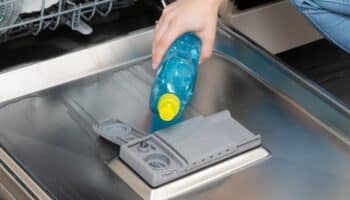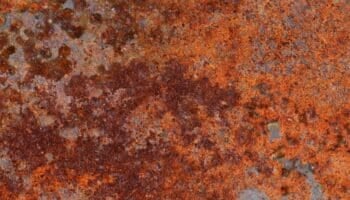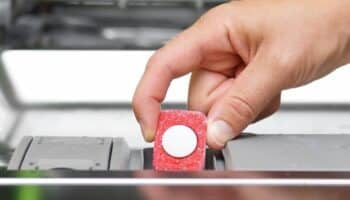Is your dishwasher sounding like it’s grinding pebbles?
That sucks! Believe it or not, the issue is not uncommon, and it affects thousands of people all over the world daily.
I know how frustrating it can be to have your dishwasher sound like it’s grinding something rather than doing your dishes, but don’t worry; you’ve come to the right place for answers. Below, you’ll find a list including 8 reasons why you’re currently in this situation and how you can address each one.
When your dishwasher sounds like it’s grinding, it can be due to a foreign object, a spray arm obstruction, limescale buildup, and a faulty wash impeller. The sound can also come from a bad pump/chopper blade, damaged motor bearings, damaged gaskets, or a faulty drain pump.
Read on to stop the grinding!
Why Your Dishwasher Sounds Like It’s Grinding
Dishwashers are great kitchen helpers, as they deal with the hassle of doing the dishes, which is most welcome – especially after a big get-together with friends and family. Unfortunately, a grinding sound can cause many people to worry, and often, with good reason.
But let’s not jump to conclusions. Sometimes, the grinding can be harmless, but in order to tell the difference between harmless grinding noises and something serious, it’s important to diagnose the dishwasher.
There are many possible reasons why your dishwasher is making a grinding noise; however, from what I’ve seen over the years, the following 8 factors are often the most common culprits.
#1 A Foreign Object
The first possible explanation for a grinding dishwasher is a foreign object that’s not supposed to be inside the appliance. As you can imagine, anything other than food residue should be kept away from your dishwasher; otherwise, trouble will arise.
Sometimes, as a washing cycle is happening, dishes can break or get chipped, dropping pieces of glass, porcelain, and even metal into your dishwasher’s drain. The situation is especially common with dishes that have been repaired or show signs of previous damage.
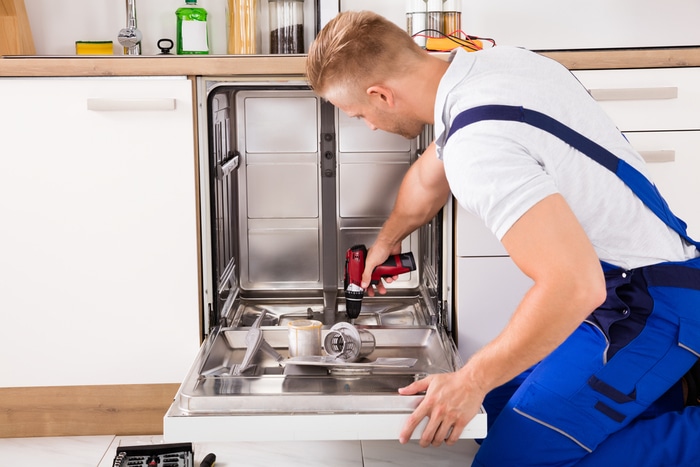
Other objects, like rings and earrings, can occasionally fall into the dishwasher as the dishes are loaded, and many people don’t notice. If your dishwasher sounds like it’s grinding something, it’s important to take a closer look inside it.
Solution: Most food residue is directed toward the dishwasher’s chopper blade for processing and removal. However, in my experience, harder foreign objects can not only damage the chopper blade and clog the appliance’s drain but also cause more severe issues.
Wait for the dishwasher to cool down and cut power to it from your circuit breakers. Unload any dishes inside the appliance’s compartment and check it thoroughly for anything unusual.
If you don’t spot anything, you’re not out of the woods yet. There’s still a chance that the foreign object has already made its way further inside the unit. Please keep reading to learn more.
#2 A Spray Arm Obstruction
Faulty spray arms can also explain why your dishwasher is making a grinding noise. Your dishwasher’s spray arms are responsible for soaking your dishes in warm water during the washing cycle. When the arms work normally, they distribute water evenly and deliver great results.
However, when the spray arms fail, not only will you notice dirty dishes at the end of a cycle, but you can also experience never-ending wash cycles and, of course, hear a grinding noise.
Solution: Checking and replacing your dishwasher’s spray arms, if necessary, is very easy, although the specifics can vary from model to model. Here are the broad strokes to give you an idea:
- Unplug the dishwasher from the wall outlet or cut power to the appliance from your circuit breakers and turn off the water supply. Then, wait for the unit to cool down completely if you just used it.
- Open the dishwasher and pull out the lower dishrack.
- When you have clear access to the spray arm, turn it counterclockwise to remove it. Gunk and limescale might have formed around the spray arm enough to make it difficult to turn; if so, use a screwdriver as leverage, but be careful not to break the spray arm.
- Check the spray arm for any signs of damage and look for foreign objects that could be causing the grinding noise. If you notice the arm is damaged, you’ll need to replace it.
- You can get the replacement spray arm replacement from several vendors online by looking for it using the model part number, which can typically be found either on the spray arm itself or in your User Manual (if you no longer have the manual, please refer to our free resource below).
- When you have the new spray arm, install it where the old one was and turn it clockwise to tighten it into position.
- Put the dishwasher’s lower dishrack back into place, close the door, and run a cycle to see if the grinding noise is still there.
Dishwasher spray arms are very durable, so, in my experience, you shouldn’t have to replace them unless they’re badly damaged or clogged.
#3 Limescale Buildup
The next possible reason why your dishwasher sounds like it’s grinding is Iimescale buildup.
Depending on where you live, you may or may not have to deal with severe limescale issues caused by hard water. Hard water is, in a nutshell, water with high mineral content. While some areas have more hard water than others, no one is safe from getting limescale over time; what changes is how often you have to deal with the problem.
You’ve probably noticed that brownish residue clogging your showerhead and getting in the way of proper water flow – that’s limescale, and it clogs your dishwasher’s components too.
If there’s enough limescale built up in your dishwasher to cause a grinding sound, you must clean the appliance immediately and get rid of the residue.
Solution: I find that a mixture of equal parts water and white vinegar does wonders when it comes to loosening and removing limescale from household appliances. The cleaning solution works for coffee makers, steamers, and many more appliances too, so if you want to try it elsewhere, be my guest!
The process of removing excess limescale from appliances is called descaling. Here’s how you can do it:
- Place your white vinegar on the dishwasher’s top rack and run a cycle without detergent.
- When the cycle is done, sprinkle baking soda at the bottom of the dishwasher and run another cycle.
The combination of white vinegar and baking soda will not only disinfect the dishwasher and help remove limescale buildup but can also eliminate stubborn smells that have collected in and around your dishwasher over the years.
#4 A Faulty Wash Impeller
The next possible reason why your dishwasher sounds like grinding is that the wash impeller is either loose, damaged, or broken altogether.
Similar to washers, dishwashers have their impeller to move water around as necessary and deliver the expected results. In the case of your dishwasher, the impeller helps move dirty water that drips from your dishes into the drain line and the chopper blade for disposal.
When the dishwasher’s wash impeller breaks or wears out, it becomes impossible to remove food debris and other residue, and the part is likely to make a grinding sound.
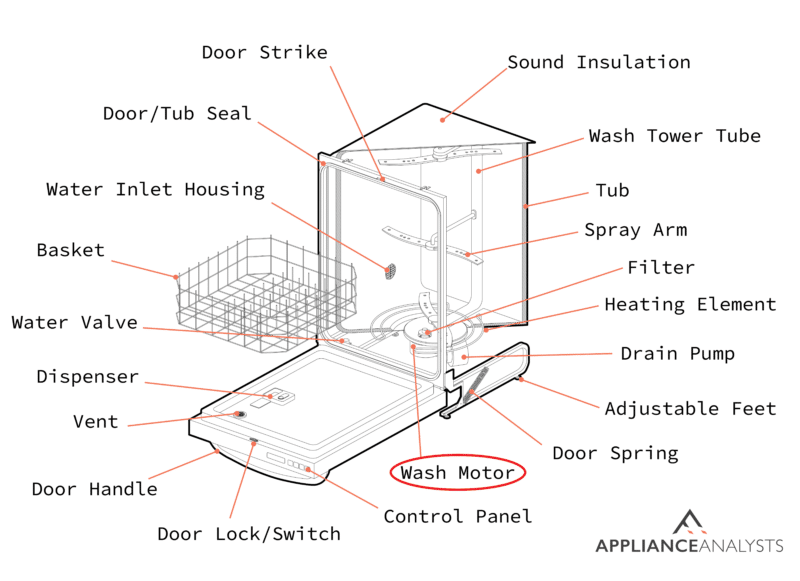
Solution: To determine what to do with your dishwasher’s impeller, I find that the best course of action is to gain comfortable access to the part and inspect it thoroughly.
Since accessing the impeller is a bit difficult, I recommend you leave the job to a professional. Once they open up the appliance, they’ll be able to tell you whether the component needs replacing. If not, debris or foreign objects may be stuck in the impeller, and their removal can help stop the grinding sound.
#5 A Bad Chopper Blade
Moving on, let’s also consider there something being wrong with your chopper blade when your dishwasher sounds like grinding. The chopper blade inside your dishwasher helps dispose of food chunks that the appliance washes off your dishes.
The chopper blade is very useful, as it prevents clogs in the drain line, which can be troublesome over time and force you to spend an entire afternoon and lots of money trying to fix it. Typically, the chopper mustn’t be replaced unless it’s worn or bent out of shape, but if it is, it can explain the grinding sound.
If the chopper blade is damaged, it won’t be able to dispose of larger food chunks, causing the drain line and pump to clog and even break if something hard manages to pass through. Also, chopper blade warping can result in the blades grinding against their housing, so it’s important to take a closer look.
Solution: To check and replace your dishwasher’s chopper blades, you’ll have to follow the steps below:
- Unplug your dishwasher or cut power to it from your circuit breakers. Shut off the water supply to the appliance from the wall valve.
- Once the dishwasher is completely cool, you can start working on it.
- Open the dishwasher and pull the dish racks out.
- Use a Phillips screwdriver and remove the screw holding the plastic tubing to the dishwasher’s back wall.
- Remove the spray arm at the bottom of the dishwasher. Some spray arms have a reverse-threaded screw, so they might need you to turn them clockwise instead of counterclockwise.
- Remove the water supply tube.
- Remove the cover beneath the spray arm’s mounting plate and undo the screws holding it in place.
- At this point, the chopper blade and its filter should be visible. Carefully remove the old chopper blade and inspect it for damage or warping.
- If everything looks okay, you can reassemble the dishwasher, as you have ruled out damage to the chopper blade. However, if there is damage to the part, you’ll need a replacement.
Before you reassemble the dishwasher, try to spot any foreign objects inside the area behind the chopper blades. If you’re lucky, no debris has made it through the blade filter. You can find a replacement for your chopper blade by referring to your User Manual and locating the part model number
#6 Damaged Motor Bearings
Damaged motor bearings can also explain why your dishwasher sounds like it’s grinding something. The motor bearings in your dishwasher allow the appliance to rotate the impeller for proper draining and also force water into the spray arms during a wash cycle.
Dishwasher motor bearings are typically well-lubricated from the factory and don’t give homeowners too much trouble. However, when you notice a grinding sound coming from your appliance, it’s possible that the bearings are damaged, obstructed, or in need of lubrication.
Solution: Accessing the dishwasher’s motor and its bearings can be a complex and long process, so I recommend you leave the job to a professional. However, if you want to take care of the repair, here are some steps you can follow:
- Repeat steps 1-7 of the previous fix.
- Take a picture of the wiring and then disconnect the cables connecting the motor to the dishwasher.
- Undo any screws holding the bearing in place.
- Check the bearing for damage, a lack of lubricant, and debris that might be getting in the way of proper rotation.
A damaged or obstructed bearing can significantly affect the motor, as it can cause it to overheat and reduce the appliance’s lifespan significantly.
#7 Damaged Gaskets
The next possible reason why your dishwasher sounds like it’s grinding something is that the gaskets are bent out of shape, loose, or broken.
The gaskets inside your dishwasher are there to keep water inside the appliance, preventing leaks. When they’re unaffected, the gaskets work wonders at helping your dishwasher complete its cycles “quietly”. However, over time, the gaskets can wear out and break, causing an improper seal between the dishwasher’s parts.
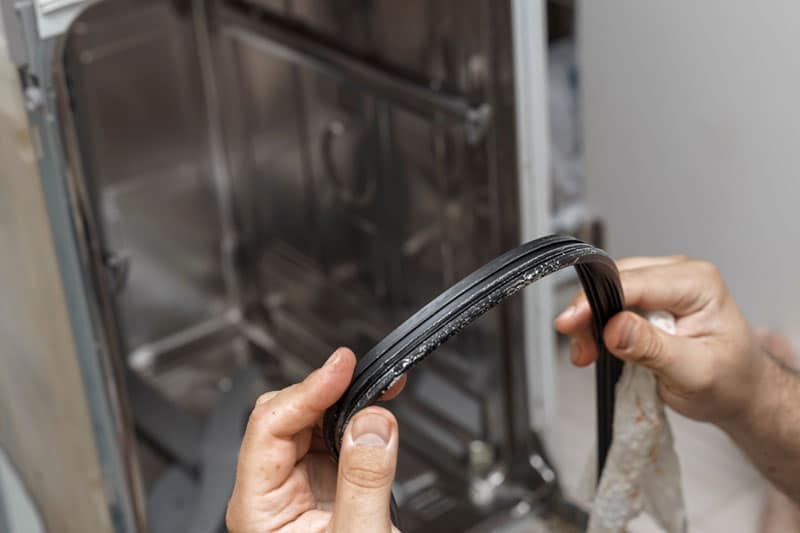
If your gaskets are damaged or loose, they can rub against other dishwasher components and cause the grinding sound you’re hearing.
Solution: As opposed to replacing the dishwasher’s bearings, I find that replacing the gaskets is very easy; you just need to find the right parts.
Analyze the gaskets and try to spot any signs of damage or wear. Also, ensure the gaskets are properly positioned and not leaving gaps between themselves and the door frame. If you need to buy new gaskets, you can do so at any online marketplace – they’re usually cheap.
#8 A Faulty Drain Pump
Lastly, let’s consider a faulty drain pump as the reason why your dishwasher sounds like it’s grinding against something. The drain pump is the component responsible for removing all the water present in your dishwasher after a wash cycle and even during one! Without the drain pump, your dishwasher would overflow, and all the food residue from your dishes would pool at the bottom.
When your dishwasher makes a grinding sound, it can be due to a foreign object that managed to get all the way through to the drain pump and is either clogging it or causing damage to it. It’s also possible that the drain pump has worn out on its own and needs replacement.
Solution: The process of replacing your dishwasher’s drain pump is very similar to that of replacing the motor bearings and checking the impeller. If you followed the instructions from the previous points, your dishwasher is likely already disassembled. Check the pump for damage and try to spot any visible obstructions.
Don’t hesitate to call a technician for help if you get stuck somewhere along the way or are unsure about the process.
Stopping Your Dishwasher’s Grinding Noise
That about covers it!
When your dishwasher sounds like it’s grinding something, it’s normal to feel worried about what it means and about the potential cost of repairs to stop the sound.
Luckily, as I hope this piece has helped you understand, addressing the most common causes behind a dishwasher’s grinding noise can be easy and quick. More often than not, something as simple as replacing the chopper blades and ensuring the gaskets are properly positioned will do the trick.
Thanks for reading. If this article was useful and answered your most burning questions, please check out our other resources and free guides below and consider subscribing to our newsletter.
Have a great day!
-Craig.






